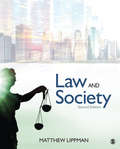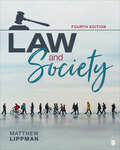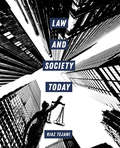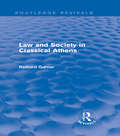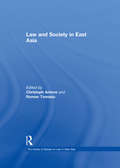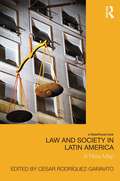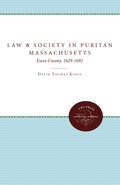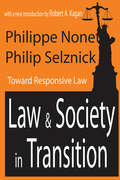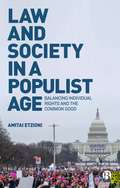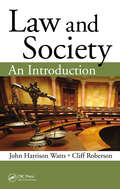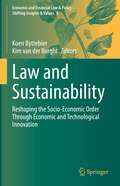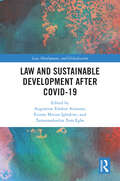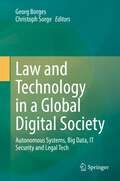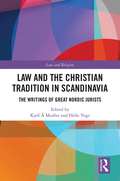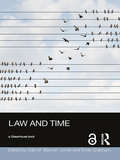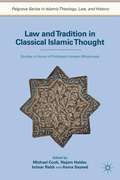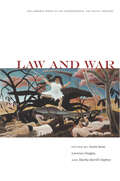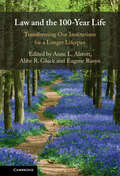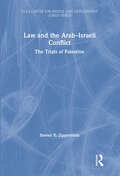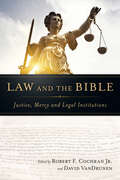- Table View
- List View
Law and Society
by Matthew Lippman“This is a well-rounded book that seems more interesting to students than other books I have used. It provides information on some cutting-edge themes in law and society while staying well grounded in the theories used by law and society practitioners.” —Lydia Brashear Tiede, Associate Professor, University of Houston Law and Society, Second Edition, offers a contemporary, concise overview of the structure and function of legal institutions, along with a lively discussion of both criminal and civil law and their impact on society. Unlike other books on law and society, Matthew Lippman takes an interdisciplinary approach that highlights the relevance of the law throughout our society. Distinctive coverage of diversity, inequality, civil liberties, and globalism is intertwined through an organized theme in a strong narrative. The highly anticipated Second Edition of this practical and invigorating text introduces students to both the influence of law on society and the influence of society on the law. Discussions of the pressing issues facing today’s society include key topics such as the law and inequality, international human rights, privacy and surveillance, and law and social control. Log in at study.sagepub.com/lippmanls2e for additional teaching and learning tools.
Law and Society
by Matthew Lippman“This is a well-rounded book that seems more interesting to students than other books I have used. It provides information on some cutting-edge themes in law and society while staying well grounded in the theories used by law and society practitioners.” —Lydia Brashear Tiede, Associate Professor, University of Houston Law and Society, Second Edition, offers a contemporary, concise overview of the structure and function of legal institutions, along with a lively discussion of both criminal and civil law and their impact on society. Unlike other books on law and society, Matthew Lippman takes an interdisciplinary approach that highlights the relevance of the law throughout our society. Distinctive coverage of diversity, inequality, civil liberties, and globalism is intertwined through an organized theme in a strong narrative. The highly anticipated Second Edition of this practical and invigorating text introduces students to both the influence of law on society and the influence of society on the law. Discussions of the pressing issues facing today’s society include key topics such as the law and inequality, international human rights, privacy and surveillance, and law and social control. Log in at study.sagepub.com/lippmanls2e for additional teaching and learning tools.
Law and Society
by Matthew LippmanLaw and Society, Fourth Edition, offers a contemporary overview of the structure and function of legal institutions, along with a lively discussion of both criminal and civil law and their impact on society. Unlike other books on law and society, Matthew Lippman takes an interdisciplinary approach that highlights the relevance of the law throughout our society. Distinctive coverage of diversity, inequality, civil liberties, and globalism is intertwined through an organized theme in a strong narrative. The highly anticipated Fourth Edition of this practical and invigorating text introduces students to both the influence of law on society and the influence of society on the law. Discussions of the pressing issues facing today′s society include key topics such as the law and inequality, international human rights, privacy and surveillance, and law and social control.
Law and Society
by Matthew LippmanLaw and Society, Fourth Edition, offers a contemporary overview of the structure and function of legal institutions, along with a lively discussion of both criminal and civil law and their impact on society. Unlike other books on law and society, Matthew Lippman takes an interdisciplinary approach that highlights the relevance of the law throughout our society. Distinctive coverage of diversity, inequality, civil liberties, and globalism is intertwined through an organized theme in a strong narrative. The highly anticipated Fourth Edition of this practical and invigorating text introduces students to both the influence of law on society and the influence of society on the law. Discussions of the pressing issues facing today′s society include key topics such as the law and inequality, international human rights, privacy and surveillance, and law and social control.
Law and Society Today
by Riaz TejaniLaw and Society Today is a problem-oriented survey of sociolegal studies, with a unique emphasis on recent historical and political developments. Whereas other texts focus heavily on criminal procedure, this book foregrounds the significant changes of the 2000s and 2010s, including neoliberalism, migration, multiculturalism, and the large influence of law and economics in law teaching, policy debates, and judicial decision-making. Each chapter presents key concepts, real-world applications, and hypothetical problems that allow students to test comprehension. With an integrated approach to theory and practice and written in an accessible tone, this text helps students recognize the dynamic forces that shape the way the law is constructed and implemented, particularly how law drives social inequality.
Law and Society in Classical Athens (Routledge Revivals)
by Richard GarnerLaw and Society in Classical Athens, first published in 1987, traces the development of legal thought and its relation to Athenian values. Previously Athens’ courts have been regarded as chaotic, isolated from the rest of society and even bizarre. The importance of rhetoric and the mischief made by Aristophanes have devalued the legal process in the eyes of modern scholars, whilst the analysis of legal codes and practice has seemed dauntingly complex. Professor Garner aims to situate the Athenian legal system within the general context of abstract thought on justice and of the democratic politics of the fifth century. His work is a valuable source of information on all aspects of Athenian law and its relation to culture.
Law and Society in East Asia (Law In East Asia Ser.)
by Christoph AntonsThe massive and complex process of change in East Asia over recent decades has brought about a transformation in the nature of law and legal institutions in the region. Whilst the process of change has to some degree mimicked western models of law and legal change, there have been significant differences in approach due to the different social foundations of East Asian societies. The more obvious of these has been the variety of ways in which rule of law ideas have been adopted in many East Asian countries where the role of the state is more dominant when compared with Western models. This volume brings together a selection of the most important writings on East Asia of researchers in recent years, and shows the broad range of questions which researchers have been addressing about the effect of law reform and legal change in societies dominated by traditional values and political forces, and at a time of massive economic change.
Law and Society in Latin America: A New Map (Law, Development and Globalization)
by Cesar Rodriguez GaravitoOver the past two decades, legal thought and practice in Latin America have changed dramatically: new constitutions or constitutional reforms have consolidated democratic rule, fundamental innovations have been introduced in state institutions, social movements have turned to law to advance their causes, and processes of globalization have had profound effects on legal norms and practices. Law and Society in Latin America: A New Map offers the first systematic assessment by leading Latin American socio-legal scholars of the momentous transformations in the region. Through an interdisciplinary and comparative lens, contributors analyze the central advances and dilemmas of contemporary Latin American law. Among them are pioneering jurisprudence and legal mobilization for the fulfillment of socioeconomic rights in a highly unequal region, the rise of multicultural constitutionalism and legal struggles around identity politics, the globalization of legal education and practice, tensions between developmental policies and environmental justice, and the emergence of a regional human rights system. These and other processes have not only radically altered the institutional landscape of the region, but also produced academic and practical innovations that are of global interest and defy conventional accounts of Latin American law inherited from law-and-development studies. Painting a portrait of the new Latin American legal thought for an international audience, Law and Society in Latin America: A New Map will be of particular interest to students of comparative law, legal mobilization, and Latin American politics.
Law and Society in Puritan Massachusetts: Essex County, 1629-1692 (Studies in Legal History)
by David Thomas KonigDistinguished by the critical value it assigns to law in Puritan society, this study describes precisely how the Massachusetts legal system differed from England's and how equity and an adapted common law became so useful to ordinary individuals. The author discovers that law gradually replaced religion and communalism as the source of social stability, and he gives a new interpretation to the witchcraft prosecutions of 1692.Originally published 1979.A UNC Press Enduring Edition -- UNC Press Enduring Editions use the latest in digital technology to make available again books from our distinguished backlist that were previously out of print. These editions are published unaltered from the original, and are presented in affordable paperback formats, bringing readers both historical and cultural value.
Law and Society in Transition: Toward Responsive Law
by Robert A. Kagan Philip Selznick Philippe NonetYear by year, law seems to penetrate ever larger realms of social, political, and economic life, generating both praise and blame. Nonet and Selznick's Law and Society in Transition explains in accessible language the primary forms of law as a social, political, and normative phenomenon. They illustrate with great clarity the fundamental difference between repressive law, riddled with raw conflict and the accommodation of special interests, and responsive law, the reasoned effort to realize an ideal of polity. To make jurisprudence relevant, legal, political, and social theory must be reintegrated. As a step in this direction, Nonet and Selznick attempt to recast jurisprudential issues in a social science perspective. They construct a valuable framework for analyzing and assessing the worth of alternative modes of legal ordering. The volume's most enduring contribution is the authors' typology-repressive, autonomous, and responsive law. This typology of law is original and especially useful because it incorporates both political and jurisprudential aspects of law and speaks directly to contemporary struggles over the proper place of law in democratic governance. In his new introduction, Robert A. Kagan recasts this classic text for the contemporary world. He sees a world of responsive law in which legal institutions-courts, regulatory agencies, alternative dispute resolution bodies, police departments-are periodically studied and redesigned to improve their ability to fulfill public expectations. Schools, business corporations, and governmental bureaucracies are more fully pervaded by legal values. Law and Society in Transition describes ways in which law changes and develops. It is an inspiring vision of a politically responsive form of governance, of special interest to those in sociology, law, philosophy, and politics.
Law and Society in Transition: Toward Responsive Law
by Robert A. Kagan Philip Selznick Philippe NonetYear by year, law seems to penetrate ever larger realms of social, political, and economic life, generating both praise and blame. Nonet and Selznick's Law and Society in Transition explains in accessible language the primary forms of law as a social, political, and normative phenomenon. They illustrate with great clarity the fundamental difference between repressive law, riddled with raw conflict and the accommodation of special interests, and responsive law, the reasoned effort to realize an ideal of polity. To make jurisprudence relevant, legal, political, and social theory must be reintegrated. As a step in this direction, Nonet and Selznick attempt to recast jurisprudential issues in a social science perspective. They construct a valuable framework for analyzing and assessing the worth of alternative modes of legal ordering. The volume's most enduring contribution is the authors' typology-repressive, autonomous, and responsive law. This typology of law is original and especially useful because it incorporates both political and jurisprudential aspects of law and speaks directly to contemporary struggles over the proper place of law in democratic governance. In his new introduction, Robert A. Kagan recasts this classic text for the contemporary world. He sees a world of responsive law in which legal institutions-courts, regulatory agencies, alternative dispute resolution bodies, police departments-are periodically studied and redesigned to improve their ability to fulfill public expectations. Schools, business corporations, and governmental bureaucracies are more fully pervaded by legal values. Law and Society in Transition describes ways in which law changes and develops. It is an inspiring vision of a politically responsive form of governance, of special interest to those in sociology, law, philosophy, and politics.
Law and Society in a Populist Age: Balancing Individual Rights and the Common Good
by Amitai EtzioniThe law-based, political institutions in many democratic societies are being challenged by fast-growing populist movements, parties, and leaders. In other nations, the state is failing. These seismic changes call for greater attention to be paid to the role society plays in forming and challenging laws—and how the law copes with these challenges. Amitai Etzioni, one of the most respected thinkers in the US, argues for a new liberal communitarian approach as an effective response to populism. This recognizes that different members of the society have differing values, interests, and needs that cannot be fully reconciled to legislation in a populist age. The book considers the core challenge in a variety of contexts, including national security versus privacy, private sector responsibility, freedom of the press, campaign finance reform, regulatory law and the legal status of terrorists. Thus the book offers a timely discussion of key issues for contemporary society and the relationship of the law to the citizen in a fast-changing environment.
Law and Society in the Age of Theoderic the Great
by Sean D. W. LaffertyThis book explores the evolution of Roman law and society in Italy from 493, with the proclamation of the Ostrogoth Theoderic the Great as king, until about 554, when the eastern Emperor Justinian was able to re-establish imperial authority in the region. Drawing upon evidence from a variety of legal and historical sources, it investigates how Theoderic and his successors attempted to govern the peninsula in the wake of foreign invasions, the collapse of civic administration, the break-up of the Mediterranean economy, and the emergence of new forms of religious and secular authority. It challenges long-held assumptions as to just how peaceful, prosperous and Roman-like Theoderic's Italy really was. Its primary focus is the Edictum Theoderici, a significant but largely overlooked document that offers valuable historical insights into the complex and sometimes contested social, political and religious changes that marked Italy's passage from Antiquity into the Middle Ages.
Law and Society: An Introduction
by Cliff Roberson John Harrison WattsIn recent years, legal studies courses have increased the focus on contemporary social issues as part of the curriculum. Law and Society: An Introduction discusses the interface between these two institutions and encourages students in the development of new insights on the topic. The book begins by introducing definitions, classifications, and the
Law and Sustainability: Reshaping the Socio-Economic Order Through Economic and Technological Innovation (Economic and Financial Law & Policy – Shifting Insights & Values #6)
by Koen Byttebier Kim van der BorghtThis book deals with some aspects of the future shape of the socio-economic order which would be founded on sustainability principles and the role of law therein, instead of on the prevailing capitalist economic order. The volume elaborates in particular on how innovation, a crucial aspect of free-market capitalism and its laws which constitute the current socio-economic order, could result in a more sustainable economy which, in turn, could lead to a more sustainable society. Moreover, the book analyses current developments in financial and economic law and evaluates their perks, risks and sustainability levels.The book contains no less than 11 chapters in which a variety of experts share their state-of-the-art insights regarding specific domains of socio-economic life. As such, the book deals with topics that are at present fully under debate in societies, such as student credit and the dangers it entails, cryptocurrencies and how the law tries to regulate this basically private law instrument, groups of companies under Belgian (company) law, a proposal for improving the international monetary system, and seeds and intellectual property rights, besides various other similar themes. The book forms the latest volume of the book series Economic and Financial Law & Policy – Shifting Insights & Values, and fully complies with the series’ goal of critically examining the legal methods and mechanisms that shape the global free markets and proposing alternatives to them. The book will hereby prove a valuable instrument for all researchers investigating these matters, besides policymakers and their advisers as well as all lawyers active in the field of economic law who look for a new perspective on the subject matters dealt with.
Law and Sustainable Development After COVID-19 (Law, Development and Globalization)
by Augustine Edobor Arimoro, Ezinne Mirian Igbokwe, and Tamaraoudoubra Tom EgbeThis book considers the impact of the COVID-19 pandemic on the realisation of the United Nations’ Sustainable Development Goals.Although efforts towards the attainment of the Sustainable Development Goals are ongoing, the COVID-19 pandemic has had a significant impact on these efforts: accentuating inequities, as well as absorbing resources. This book addresses this impact, as it takes up the question of how to ensure global recovery – in line with the target for the Sustainable Development Goals – after the pandemic. Adopting an interdisciplinary approach, but focusing particularly on the role of law and legal frameworks in this recovery, the book considers the effect of the pandemic on key industries such as shipping, insurance, manufacturing, and banking, as well as on the role of the State and non-State actors. Pursuing an explicitly Global South perspective, the book maintains that in the post-COVID era it is the elaboration a rule of law framework that is in sync with both the Global North and South that is crucial if the Sustainable Development Goals are to be achieved.This book will be of value to scholars, students and policymakers working in the general area of law and development, but especially those with specific interests in the United Nations’ Sustainable Development Goals.
Law and Technology in a Global Digital Society: Autonomous Systems, Big Data, IT Security and Legal Tech
by Georg Borges Christoph SorgeThis book examines central aspects of the new technologies and the legal questions raised by them from both an international and an inter-disciplinary perspective. The technology revolution and the global networking of IT systems pose enormous challenges for the law. Current areas of discussion relate to autonomous systems, big data and issues surrounding legal tech. Ensuring data protection and IT security as well as the creation of a legal framework for the new technology as a whole can only be achieved through international and inter-disciplinary co-operation.The team of authors is made up of experienced, internationally renowned experts as well as young researchers and professionals who give valuable insights from numerous different jurisdictions. This book is written for jurists and those responsible for technology in public authorities and companies as well as practising lawyers and researchers.
Law and The Christian Tradition in Scandinavia: The Writings of Great Nordic Jurists (Law and Religion)
by Kjell Å Modéer and Helle VogtThis book presents a comprehensive history of law and religion in the Nordic context. The entwinement of law and religion in Scandinavia encompasses an unusual history, not widely known yet important for its impact on contemporary political and international relations in the region. The volume provides a holistic picture from the first written legal sources of the twelfth century to the law of the present secular welfare states. It recounts this history through biographical case studies. Taking the point of view of major influential figures in church, politics, university, and law, it thus presents the principal actors who served as catalysts in ecclesiastical and secular law through the centuries. This refreshing approach to legal history contributes to a new trend in historiography, particularly articulated by a younger generation of experienced Nordic scholars whose work is featured prominently in this volume. The collection will be a valuable resource for academics and researchers working in the areas of Legal History and Law and Religion.
Law and Time: Things, Form, And The Enactment Of Law (Social Justice)
by Emily Grabham Sian Beynon-JonesResearch on law's relationship with time has flourished over the past decade. This edited collection aims to put law and time scholarship into wider context, advancing conversations on time and temporalities between socio-legal scholars, anthropologists, sociologists, geographers and historians. Through a diverse range of contributions, the collection explores how legal modalities of time emerge and have effects within wider clusters of social and political action. Themes include: law’s diverse roles in maintaining linear historicist models of time; law’s participation in the materialisation of times; and the unsteady effects of temporal pluralism and polytemporalities in law. De-naturalising the ‘time’ in law and time scholarship, this collection positions time as something that can be enacted and materialised as well as experienced, with distinct implications for questions of social justice.
Law and Tradition in Classical Islamic Thought
by Najam Haider Asma Sayeed Michael Cook Intisar RabbBringing together essays on topics related to Islamic law, this book is composed of articles by prominent legal scholars and historians of Islam. They exemplify a critical development in the field of Islamic Studies: the proliferation of methodological approaches that employ a broad variety of sources to analyze social and political developments.
Law and War
by Austin Sarat Lawrence Douglas Martha Merrill UmphreyLaw and War explores the cultural, historical, spatial, and theoretical dimensions of the relationship between law and war#151;a connection that has long vexed the jurisprudential imagination. Historically the term "war crime" struck some as redundant and others as oxymoronic: redundant because war itself is criminal; oxymoronic because war submits to no law. More recently, the remarkable trend toward the juridification of warfare has emerged, as law has sought to stretch its dominion over every aspect of the waging of armed struggle. No longer simply a tool for judging battlefield conduct, law now seeks to subdue warfare and to enlist it into the service of legal goals. Law has emerged as a force that stands over and above war, endowed with the power to authorize and restrain, to declare and limit, to justify and condemn. In examining this fraught, contested, and evolving relationship, Law and War investigates such questions as: What can efforts to subsume war under the logic of law teach us about the aspirations and limits of law? How have paradigms of law and war changed as a result of the contact with new forms of struggle? How has globalization and continuing practices of occupation reframed the relationship between law and war?
Law and the "Sharing Economy": Regulating Online Market Platforms (Law, Technology, and Media)
by Derek McKee, Finn Makela, and Teresa ScassaLa controverse entoure les plateformes d’économie de partage, partiellement en raison de leur impact économique. Certains secteurs subissent des contrecoups de manière plus aigüe : les chauffeurs d’Uber font concurrence aux chauffeurs de taxi, ou les hôtes Airbnb rivalisent avec les hôtels. Par ailleurs, Uber exacerberait l’emploi précaire et mal rémunéré tandis qu’Airbnb amplifierait la spéculation immobilière et entraînerait, à terme, une hausse du coût de location.On a tenté de réglementer ce type de plateformes, mais la technologie est telle qu’elle permet aux entreprises d’aisément contourner la réglementation conventionnelle, si bien que les accusations de « concurrence déloyale » fusent de toutes parts, provoquant une remise en question du cadre réglementaire. En effet, de telles plateformes viennent brouiller les cartes, confondant les distinctions convenues entre personnel et commercial, infrastructure et contenu, autonomie contractuelle et contrôle hiérarchique. Cette ambiguïté peut avoir d’importantes répercussions sur le bon fonctionnement de l’appareil réglementaire qui encadre les principes organisateurs du travail, de la concurrence, de l’impôt, de l’assurance, de l’information et de de l’interdiction de la discrimination, sans parler de la réglementation sectorielle spécialisée.Cinq thématiques sont abordées dans cet ouvrage : les technologies de la réglementation; la réglementation de la technologie; les lieux de la réglementation (du local au mondial); la réglementation des marchés; et la réglementation du travail. Les chapitres se conjuguent pour offrir une réflexion d’une gamme d’experts sur la jurisprudence traditionnelle que sur les approches théoriques qui informent et façonnent la réglementation de l’économie du partage.Publié en anglais.
Law and the 100-Year Life: Transforming Our Institutions for a Longer Lifespan
by Anne L. Alstott Abbe R. Gluck Eugene RusynLaw and the 100-Year Life addresses the growing trend of Americans living longer and healthier lives, with many reaching the age of 100. An aging nation presents new challenges for society, which must be reimagined to accommodate longer and more varied careers, multiple marriages, and defining moments of education. This volume explores the possibility of a 'third demographic dividend', a new period of productivity following middle age, and the potential for law and policy to support or divide aging citizens. Leading scholars across various fields come together to explore topics related to aging, such as health law and trusts and estates, as well as less obvious but equally important areas like housing, criminal justice, and education. This title is also available as Open Access on Cambridge Core.
Law and the Arab–Israeli Conflict: The Trials of Palestine (UCLA Center for Middle East Development (CMED) series)
by Steven E. ZippersteinDuring the British Mandate for Palestine (1922–1948), Arabs and Jews repeatedly used the law to gain leverage and influence international opinion, especially in three dramatic and largely forgotten trials involving two issues: the interplay between conflicting British promises to the Arabs and Jews during World War I, and the parties’ rights and claims to the Wailing Wall. Focusing on how all three parties – Arab, Jewish, and British – used the law and the legal process to advance their objectives during the Mandate years, this volume reveals how the parties availed themselves – with varying degrees of success – of the law and the legal process. The book examines various legal arguments they proffered, and how that early tendency to resort to the law as a tool, a resource, and a weapon in the conflict has continued to this day. The research relies almost entirely on primary source documents, including transcripts of the public and secret testimony before the Shaw, Lofgren, and Peel Commissions, diaries, letters, government files, and other original sources. This study explores the origins of many of the fundamental legal arguments in the Arab–Israeli conflict that prevail to this day. Filling a gap in research, this is a key text for scholars and students interested in the Arab–Israeli conflict, Lawfare, and the Middle East.
